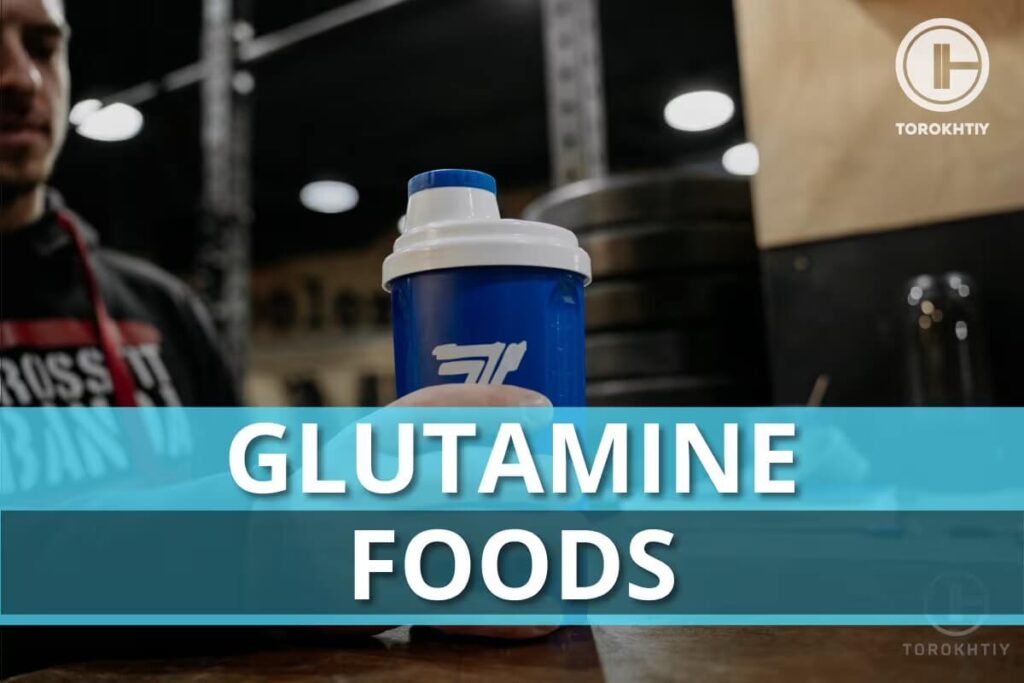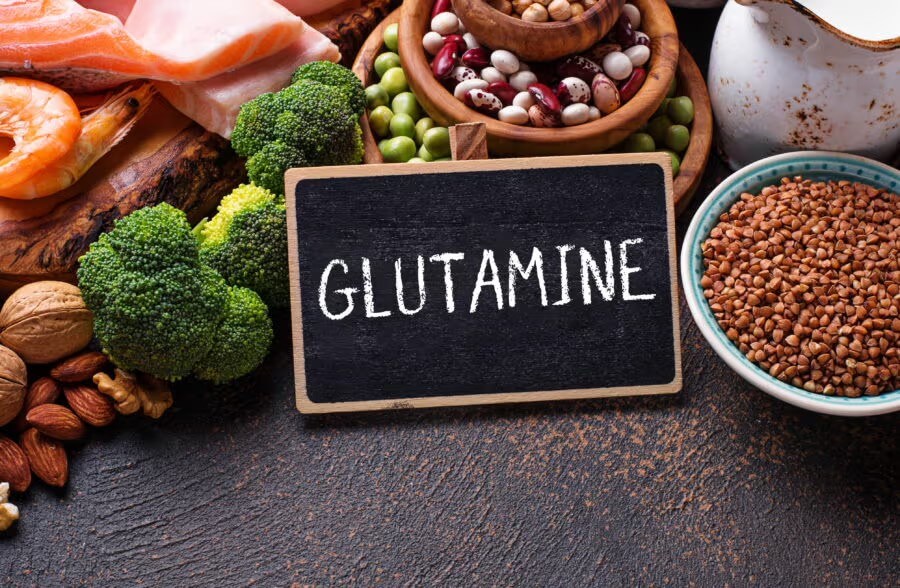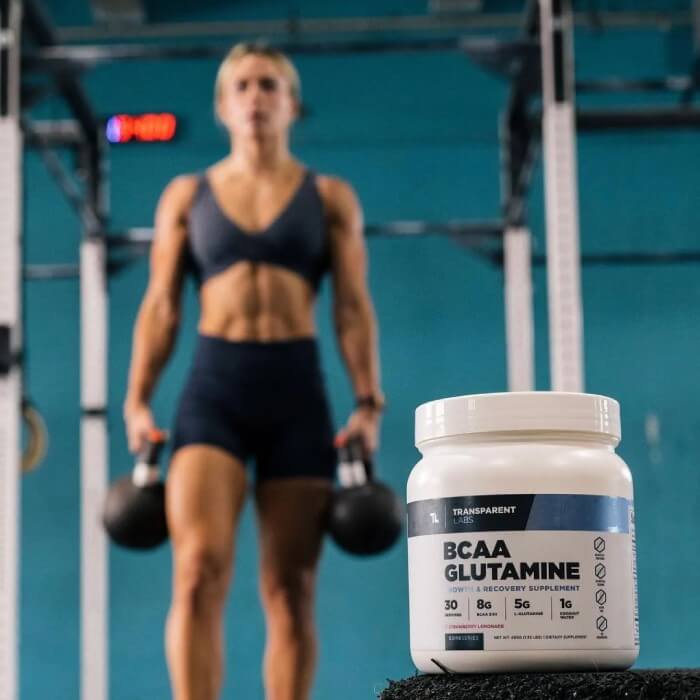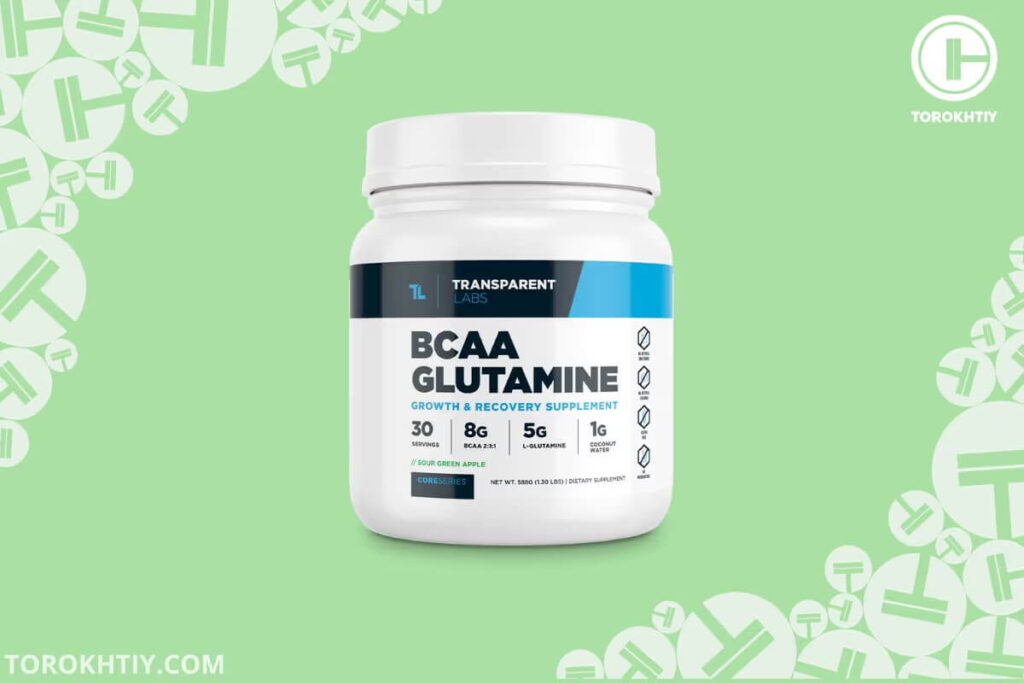17 Best Glutamine Foods (Both Animal & Plant Based)
Looking to get more Glutamine in through your diet? Then look no further, as we’ll be covering some of the best Glutamine foods you can eat.
Whether you want more Glutamine to prevent muscle soreness or to help with overall health, use this list as a guide for how to get more Glutamine in, and how to determine how much Glutamine is in food.
You may also be interested in supplementing with Glutamine if you struggle to get enough in through your diet. If this is the case, then check out BCAA Glutamine Intra Workout from Transparent Labs.
Because it’s an Amino acid, most Glutamine foods are rich in protein. Some sources include:
- Meat (Beef, Chicken, Fish, etc.)
- Dairy Products
- Eggs
- Beans
- Certain Vegetables (Beets, Cabbage, Spinach, Carrots, etc.)
The body naturally produces Glutamine, but extra dietary Glutamine may be beneficial for recovery.

What is Glutamine?
Glutamine is a non-essential amino acid and is the most abundant amino acid in the body. As a result, it has many different uses in the body including helping the immune system, brain function, and digestion.
The body can produce enough Glutamine for these everyday purposes. It is also found in the diet through foods rich in protein, which we’ll be covering in more depth below. But, if the body can produce adequate glutamine, is it necessary to prioritize in the diet?
While Glutamine deficiency is especially rare, it appears that the body may need extra Glutamine during recovery after particularly strenuous exercise.
This is because the body uses significant amounts of glutamine, especially during endurance training. This is where prioritizing Glutamine in the diet or supplementation may be beneficial.
How Much Glutamine Do We Get From Food Every Day?
Without knowing your exact protein intake, it’s difficult to say exactly how much Glutamine you get through food every day. This is because different diets will lead to different total Glutamine intake.
Also, because the body makes its own Glutamine, it’s not a nutrient of interest for most people. If you’re interested in determining your Glutamine intake, there’s a calculation you can do to get a rough estimate.
As we’ll cover more in-depth below, Glutamine appears to make up 4-8% of all naturally occurring proteins.
So, to figure out your daily intake of Glutamine, simply determine what 4-8% of your daily protein intake is. If you eat 100g of protein a day, you’re likely getting between 4-8g of Glutamine
It appears that most people get anywhere between 1-6g of Glutamine through their diet every day. Because Glutamine is mainly found in the diet through animal products, we can assume that vegans and vegetarians will be on the lower end of this range, and those who eat a diet rich in meat will be higher.

Which Foods Contain the Most Glutamine?
It’s worth noting that it’s difficult to find data on how much Glutamine is in specific foods. However, as mentioned above, studies show that 4-8% of naturally occurring protein is made up of Glutamine.
We can then use this as a guide for how much Glutamine is in specific foods. Note that we’ll be using USDA’s nutritional information for all the foods mentioned below.
There is one study that more accurately measured how much Glutamine is in specific foods. The foods with Glutamine they measured were Beef, Skim Milk, White Rice, Corn, Tofu, and Egg. Because these are the most accurate figures we could find, we’ll be referencing these numbers below as well.
As you’ll see, the Glutamine content found through our 4-8% calculation is consistently in line with the numbers found in the study. This confirms that this calculation is good for getting rough estimates of Glutamine content.
So, let’s take a look at how much L-Glutamine in food you can expect to find.
1. Animal Based Protein Foods
– Meat (Beef, Chicken, Fish, etc.)
Let’s start with beef as an example, as it’s one of several foods high in Glutamine that was covered in the study mentioned above. Steak has 25g of protein/100g. Using our 4-8% number, this means 100g of beef has 0.69-1.38g of Glutamine.
This is in line with the study which showed that beef has ~1.2g of Glutamine per 100g. This shows us that our formula is fairly accurate. So, if you’re curious about how much glutamine is in any food, simply figure out what 4-8% of its protein content is.
Using this same formula let’s take a look at some other meats:
| Meat | Protein (per 100g) | Glutamine (per 100g) |
|---|---|---|
| Beef (90/10, Raw) | 23.1g | ~0.92-1.84g |
| Salmon (Raw) | 20.4g | ~0.82-1.64g |
| Chicken Breast (Raw) | 22.5g | ~0.9-1.8g |
| Pork Loin (Raw) | 21g | ~0.84-1.68g |
– Eggs & Dairy
Both eggs and skim milk were covered in the study mentioned above. It found that skim milk contained ~0.28g of Glutamine/100g, while Eggs contained ~0.56g/100g. As you can see once again from the table below using our 4-8% calculation, this is a fairly accurate method for estimating glutamine content.
| Vegetarian Protein | Protein (per 100g) | Glutamine (per 100g) |
|---|---|---|
| Skim Milk | 3.5g | ~0.14-0.28g |
| Eggs | 12.6g | ~0.5-1g |
2. Plant-Based Protein Foods
– Plant-Based Protein (Beans, Lentils, Rice, and Tofu)
Now, how much Glutamine is found in common plant-based sources of protein? According to our study, tofu has ~0.6g of glutamine/100g, and white rice has ~0.3g/100g. Using our 4-8% calculation, let’s take a look at some other sources of plant-based protein below:
| Plant-Based Protein | Protein (per 100g) | Glutamine (per 100g) |
|---|---|---|
| Tofu | 8g | ~0.32-0.64g |
| Rice (Raw) | 7g | ~0.28-0.56g |
| Beans (Raw) | 21g | ~0.84-1.68g |
| Lentils (Raw) | 26g | ~1.04-2.08g |
| Whole Grain Bread | 13g | ~0.52-1.04g |
– Vegetables
The only vegetable covered in the study was corn, which has ~0.4g of glutamine/100g. Let’s take a look at some other common vegetable sources of protein to see which are best for Glutamine:
| Vegetable | Protein (per 100g) | Glutamine (per 100g) |
|---|---|---|
| Corn | 3.4g | ~0.14-0.28g |
| Spinach | 2.9g | ~0.12-0.24g |
| Carrots | 0.9g | ~0.04-0.08g |
| Cabbage | 1.3g | ~0.05-0.1g |
| Beets | 1.6g | ~0.06-0.12g |
Do We Really Need to Worry About How Much Glutamine We Get From Food?
As we’ve mentioned several times above, our bodies can produce enough Glutamine on their own to sustain normal function. As you can see from the tables above, all protein-rich foods are sources of Glutamine. However, our bodies don’t necessarily rely on the glutamine we get from food.
With that being said, getting adequate protein intake is still necessary for replacing the protein used by the body for building muscle and everyday bodily functions. While our body takes a small amount of glutamine from food, it primarily produces its own to replace what’s being used.
As a result, there isn’t much of a reason to worry about Glutamine intake as long as you’re getting adequate protein intake.

Glutamine deficiency is possible, when someone is unable to produce enough glutamine on their own. This typically happens with people undergoing heavy amounts of physical stress, like during periods of illness or injury.
In these scenarios, Glutamine can be depleted rapidly, and the body won’t be able to manufacture it fast enough. In these cases, supplementation is often used to supply the body with enough Glutamine to maintain normal function.
However, in healthy humans increased protein intake may be sufficient as well, with no need for extra glutamine supplementation. With this being said, you may be interested in prioritizing Glutamine to aid with recovery or to boost your overall health.
If this is the case, then you may be better off supplementing with Glutamine instead of trying to get as much through your diet as possible.
However, our bodies are very good at using and regulating glutamine, and getting heavy amounts through supplementation is likely unnecessary.
What Benefits Can Glutamine Bring?
Below we’ll be covering some of the potential benefits of additional Glutamine supplementation. The main benefit for athletes will center around improving recovery, but some of the other benefits include gastrointestinal health and immune function.
We’ll also be going over why Glutamine is prescribed for recovery from illness, injury, or surgery. Let’s get into it.
1. Muscle Recovery and Performance
First, and likely what most people are interested in, is Glutamine’s benefits for exercise. One study has linked Glutamine supplementation with earlier recovery from exhaustive exercise. This study also demonstrated increased time to exhaustion.
It’s worth noting that Glutamine was given at a high dose of 0.3g/kg of body weight, which works out to about 20g for a 150lb person.
It was also given consistently daily over 6 days. It’s unclear if a lower dose will produce similar results, or if there will be any acute results from a single dose of Glutamine.
However, a meta-analysis on glutamine showed that there was no effect on athletes immune systems, aerobic performance, or body composition. As a result, it’s difficult to recommend the use of glutamine supplementation for these purposes.
2. Gastrointestinal Health
Research has shown that Glutamine plays a role in positive gut health through several factors like the gut microbiome, gut lining and the modulation of inflammatory responses.
It’s thought that this effect may have applications in treating depression because of the relationship between gut health and the brain.
Similar to the above study, it’s worth noting that changes in the gut microbiome were only observed with heavy supplementation of 30g a day over 14 days.
3. Immune Function
Glutamine supplementation has been thought to help with immune function specifically after exercise as it is believed that a decrease in plasma glutamine could lead to an increased risk of infection.
However, as mentioned above, current research suggests that increased Glutamine intake does not have a major direct effect on immune function for healthy people.
Glutamine produced by the body plays a valuable role in our immune systems when we’re sick.
This is likely why decreased glutamine stores are more common when sick, and why increased glutamine is beneficial to maintain these functions.
With that being said, when sick or experiencing some gut problems – it might be beneficial to supplement Glutamine.
4. Treatment for Injury, Illness, or Surgery
Glutamine has been proposed as a potential therapy/treatment for a whole host of conditions including HIV, Cancer, Angina, and Crohn’s Disease.
It has also been shown to provide benefits to those in recovery from critical illness, likely because of the immune effects mentioned above.
While there are some studies that show promising results, it’s difficult to say exactly how significant the effects of Glutamine will be on these conditions.
Best Glutamine Supplement – BCAA Glutamine Intra Workout from Transparent Labs
Before getting into the Glutamine product we recommend, it’s important to note that you’re almost definitely getting enough Glutamine in through your diet already. Also, the study that showed effects on athletic performance used fairly high doses every day.
However, if you’re interested in trying Glutamine out, then check out BCAA Glutamine from Transparent Labs. Each serving of this supplement has 5g of Glutamine.
This is roughly equivalent to how much Glutamine someone will get through food on an average day. So, this supplement could be a good way to effectively double your glutamine intake!
Once again, it should be noted that you’d need to take ~4 servings of this supplement to replicate the amount given to athletes in the study done on recovery and performance.

On top of the Glutamine, this supplement also contains 8g of BCAAs, 1.5g of Vitamin C, and 1g of Coconut Water Powder in each serving.
Similar to Glutamine, most people get more than enough BCAAs through their diet alone, making supplementation somewhat unnecessary. However, vegans and vegetarians who don’t consume much total protein may get more of a benefit from BCAAs.
For Vitamin C, such an excessive amount may be beneficial if you’re not getting very much in your diet already. However, for the average person, most of this will likely just be excreted.
Finally, Coconut Water Powder is a rich source of electrolytes, specifically potassium. Especially when combined with a bit of salt, Transparent Labs BCAA Glutamine supplement could also be effective for rehydration after a long workout.
Like all Transparent Labs products, this one is made with all-natural ingredients containing no artificial sweeteners, coloring, or preservatives. It comes in a solid 4 flavors and is sweetened naturally with stevia.
It’s worth noting that this supplement is a bit pricey considering the ingredient breakdown at ~$1.33 per serving. However, if you’re after a high-quality Glutamine supplement, you can always trust Transparent Labs to deliver on quality.
FAQ
What Foods Are High in Glutamine?
Glutamine makes up anywhere from 4-8% of all protein. So, any food that’s especially high in protein will also be foods high in L-Glutamine.
An easy way to calculate how much glutamine you’re getting is to simply determine the protein content of what you’re eating, and figure out what 4-8% of that number is!
This will give you a fairly accurate estimate of total glutamine content.
Are Eggs High in Glutamine?
According to our calculations, 100g of eggs have between ~0.5-1.0g of glutamine. While this is fairly high for a vegetarian food, they don’t have as much glutamine as most meat per 100g.
Keep in mind that glutamine is directly related to protein content, so any foods with a lot of protein can be considered Glutamine-rich foods.
How Can I Increase My Glutamine Naturally?
If you’re wondering how to get L-Glutamine naturally, the easiest way to naturally increase intake is to simply eat more protein every day. Essentially all foods with protein are foods that contain Glutamine.
All protein is made up of anywhere from 4-8% glutamine, so the more protein you eat, the more glutamine you’ll be getting as well. The body can regulate glutamine very well on its own, so there’s no need to worry about extra intake given sufficient protein consumption.
Conclusion
Glutamine is a non-essential amino acid that is sufficiently produced by the body, and as a result, glutamine deficiency is exceedingly rare. However, extra glutamine can be found through diet as well.
Glutamine makes up 4-8% of all protein, so any foods high in protein will also be high in glutamine. If you’re after more L-Glutamine, natural sources include meat, fish, eggs, dairy, beans, lentils, and tofu.
Keep in mind that the athletic benefits of glutamine have only been documented with high supplemented doses of ~20g+ daily. If you’re interested in supplementing with Glutamine on top of your dietary intake, check out BCAA Glutamine Intra Workout from Transparent Labs.
Were you aware that Glutamine was so common in foods? Have you ever tried supplementing with Glutamine? Let us know in the comments below!
Also read:
- L-Arginine vs L-Citrulline
- Foods With Citrulline
- Foods High in L Arginine
- Best Time of Day to Take Glutamine
- Best Time to Take L-Glutamine for Weight Loss
- L Carnitine Tartrate vs Acetyl L Carnitine
- Taking L Carnitine Without Exercising
- L Carnitine for Weight Loss
- Best L Carnitine Supplement
- Best EAA Powder
References:
- “Glutamine” Oxford Referencing Guide, http://hyperphysics.phy-astr.gsu.edu/hbase/Organic/Glutamine.html
- B I Labow 1, W W Souba, Glutamine (National Library of Medicine), https://pubmed.ncbi.nlm.nih.gov/11193715/, 2000 Dec;24(12):1503-13
- CM Lenders,1,2,3,4 S Liu,1,5 DW Wilmore,3,6 L Sampson,1,7 LW Dougherty,1,8 D Spiegelman,1,9 and WC Willett, Evaluation of a novel food composition database that includes glutamine and other amino acids derived from gene sequencing data (National Library of Medicine), https://www.ncbi.nlm.nih.gov/pmc/articles/PMC3249386/ (2009 Sep 16), 10.1038/ejcn.2009.110
- Glutamine (Association for the Advancement of Restorative Medicine), https://restorativemedicine.org/library/monographs/glutamine/
- Piattoly, Tavis Joseph, “L-glutamine supplementation: effects on recovery from exercise” (2005), LSU Master’s Theses, 3783.
- Starkie Sowers, A Primer On Branched Chain Amino Acids (Huntington College of Health Sciences), https://www.huhs.edu/literature/BCAA.pdf
- Vitamin C (Hsph Harvard), https://www.hsph.harvard.edu/nutritionsource/vitamin-c/
Why Trust Us?
With over 20 years in Olympic Weightlifting, our team does its best to provide the audience with ultimate support and meet the needs and requirements of advanced athletes and professional lifters, as well as people who strive to open new opportunities and develop their physical capabilities with us.
By trusting the recommendations of our certified experts in coaching, nutrition, dietology, and sports training programming, as well as scientific consultants, and physiotherapists, we provide you with thorough, well-considered, and scientifically proven content. All the information given in the articles concerning workout programming, separate exercises, and athletic performance, in general, is based on verified data. We ensure that you can rely on our professionals’ pieces of advice and recommendations that can be treated as personalized ones which will benefit you and fully meet your needs.
The product testing process is described in more detail here
Author: Jacek Szymanowski
Certified Nutritionist,
M.Sc.Eng. Biotechnology
Performance Architect,
Strength and Conditioning Specialist
With over 30 years of fighting experience, specialization in nutrition coaching for athletes, and expertise in metabolic health and dietary strategies, Jacek offers a comprehensive approach to optimizing your performance and well-being. Backed by a Master of Science degree in Biotechnology, Jacek remains at the forefront of scientific advancements, ensuring that his coaching is always evidence-based and up-to-date.








